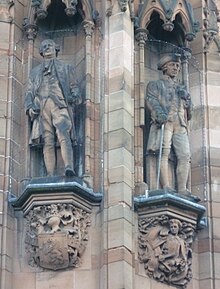
| Part of the Politics series on |
| Neoliberalism |
|---|
Since its founding in 1843, the editorial stance of The Economist has been developed to further its founding purpose to "take part in a severe contest between intelligence, which presses forward, and an unworthy, timid ignorance obstructing our progress". First published by Scottish economist James Wilson to muster support for abolishing the British Corn Laws (1815–1846), a system of import tariffs, the weekly has made free trade a touchstone of their editorial stance. Its core stance has been summarized by The Guardian as a "trusted three-card trick of privatisation, deregulation and liberalisation".[1]
In 2009, The Economist website featured this note about its editorial stance:
"What, besides free trade and free markets, does The Economist believe in? 'It is to the Radicals that The Economist still likes to think of itself as belonging. The extreme centre is the paper's historical position.' That is as true today as when former Economist editor Geoffrey Crowther said it in 1955. The Economist considers itself the enemy of privilege, pomposity and predictability. It has backed conservatives such as Ronald Reagan and Margaret Thatcher. It has supported the Americans in Vietnam. But it has also endorsed Harold Wilson and Bill Clinton, and espoused a variety of liberal causes: opposing capital punishment from its earliest days, while favoring penal reform and decolonization, as well as—most recently—gun control and gay marriage."[2]
- ^ Stern, Stefan (21 August 2005). "Economist thrives on female intuition". The Guardian. London. Retrieved 2 January 2013.
- ^ "About us". Economist.com. Archived from the original on 28 February 2009. Retrieved 21 March 2009.
© MMXXIII Rich X Search. We shall prevail. All rights reserved. Rich X Search
